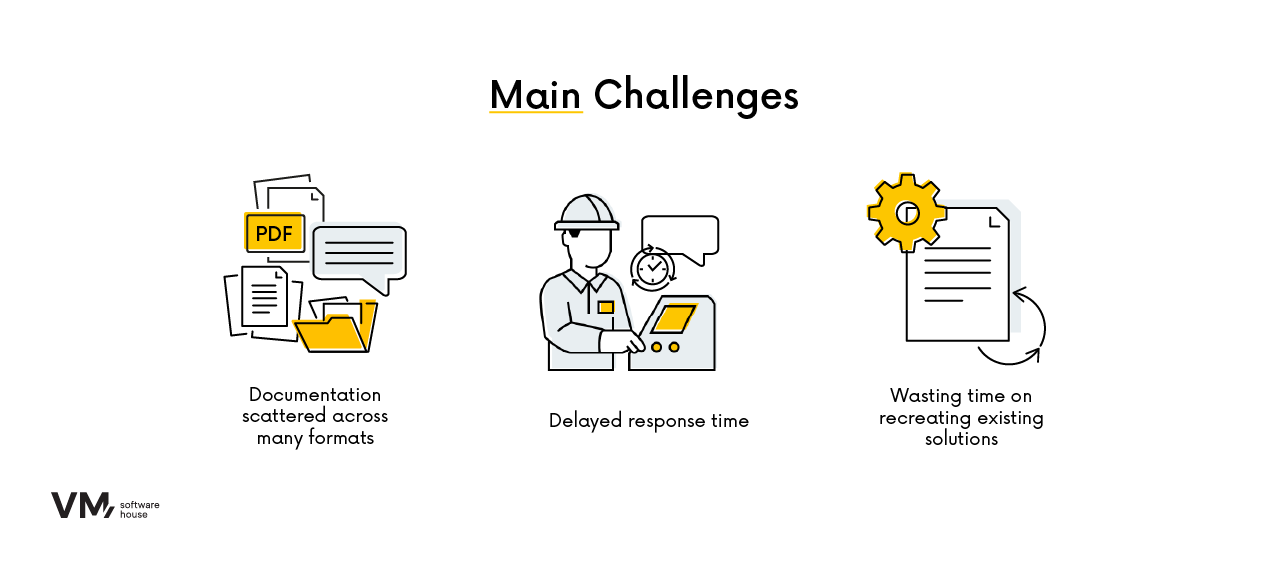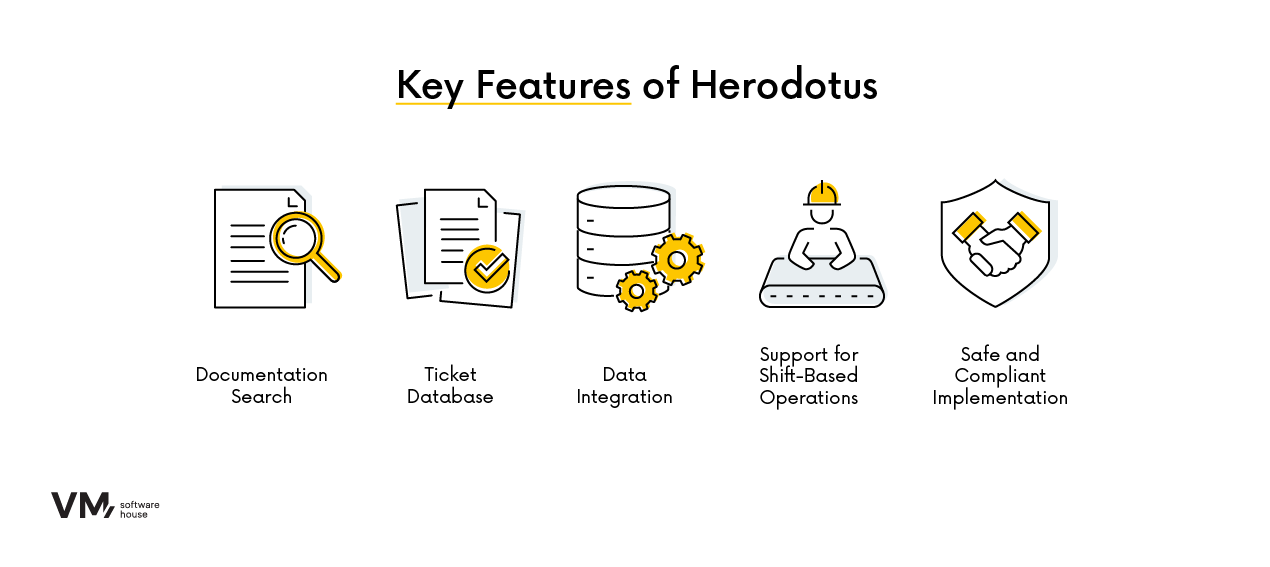This website uses cookies so that we can provide you with the best user experience possible. Cookie information is stored in your browser and performs functions such as recognising you when you return to our website and helping our team to understand which sections of the website you find most interesting and useful.

Client
One of the European manufacturing sites of a major pharmaceutical company, specializing in the industrial production of solid dosage forms (e.g., tablets and capsules), was seeking a way to reduce response times during emergency situations. Due to the large scale of operations and complex machine infrastructure, the maintenance team needed a tool that would enable fast and secure access to knowledge—regardless of shift, tenure, or employee experience level.
Challenge
A machine failure in a manufacturing facility demands an immediate response. Unfortunately, access to critical information was fragmented:
- Technical documentation existed in multiple formats,
- Failure history was stored across separate systems,
- Operational know-how was undocumented and “scattered across shifts.”
As a result:
- Response times were too long,
- Diagnoses were often based on intuition or incomplete data,
- The service team spent valuable time searching for information or consulting colleagues,
- Potential solutions were frequently repeated or reinvented from scratch.
The goal of the project was to create a system that:
- Integrates documentation, incident history, and technical notes in one place,
- Allows employees to ask questions in natural language and receive accurate answers,
- Is available 24/7 and easy to use, even for non-technical staff,
- Complies with IT security policies and can be deployed on-premises.

Solution
In response to the client’s needs, we developed Herodotus – an AI-powered Help Desk system designed to support maintenance operations and simplify the daily work of technical teams.
Herodotus is built on a Retrieval-Augmented Generation (RAG) architecture. The system does not generate random responses, but instead searches through documents, tickets, and other approved resources, then formulates answers to the given questions by referencing specific sources such as PDFs, support tickets, or system logs. Thanks to the use of Large Language Models (LLMs), the responses are precise and contextually accurate.
Key Features of the System
- Manufacturer Documentation Search
Users don’t need to know file structures or folder names—just ask a question in natural language. The RAG-based system locates the relevant section of the manual or technical diagram. - Ticket Database
All past incidents and their resolutions are stored in one place, ready to be reused whenever a similar issue arises. - Integration of Multiple Sources
Herodotus, powered by RAG, connects documentation, repository files, service bulletins, checklists, and logs—eliminating the need for manual searches across systems. - Barrier-Free Shift Work
The RAG-based system is available at all times, across all shifts—ensuring every user accesses the same, up-to-date knowledge base. - Secure Deployment and Quality Control
Herodotus operates within a “restricted context”—it processes only client-provided data and never generates answers from outside the defined knowledge base.

Results
Reduced diagnosis and repair time (MTTR – Mean Time To Repair)
By centralizing knowledge and providing access to previous incidents, technicians can identify root causes and take corrective actions much faster.
Downtime reduction by 50–70%
The system significantly shortens reaction time in critical situations, directly improving machine availability and overall line productivity.
Up to 40% of breakdowns resolved without maintenance team involvement (Maintenance Department)
Line operators can now fix many issues independently as part of Autonomous Maintenance (AM), using verified knowledge stored in the system.
Support for preventive and continuous improvement initiatives
Herodotus assists in performing Root Cause Analysis (RCA), generating Kaizen improvement ideas, and providing topics for TPM (Total Productive Maintenance) and RCM (Reliability-Centered Maintenance) meetings, reinforcing a culture of continuous improvement and standard work practices.
Knowledge retention and accessibility
Maintenance know-how is preserved, searchable, and always up-to-date, even as personnel change over time.
Secure AI implementation in industrial environments
Herodotus complies with IT security policies and can be deployed either on-premise or in the cloud (e.g., Azure), ensuring full data control.
Collaboration Model
Full Deployment Tailored to the Plant’s Reality
We begin with an in-depth analysis of available resources—technical documentation, incident databases, work files, and procedures. Based on this, we configure the system to fit the specific processes and needs of the maintenance team.
Team Training
We provide hands-on training for technical staff. We teach not only how to ask questions to the system, but how to apply it effectively during shifts—for diagnosing faults, solving issues, and working with documentation.
Ongoing Support and Development
As part of our support package, we offer user onboarding, prompt optimization, and advisory services for further solution development. We assist in expanding the knowledge base, scaling the system to additional departments, and integrating it with the existing infrastructure.
About the Project
Herodotus does not replace humans – instead, it gives them access to knowledge that was previously hidden in files, notes, and team members’ memories. RAG and LLM technologies accelerate decision-making, improve responsiveness, and organize knowledge where every minute counts.
Technologies
- Retrieval-Augmented Generation (RAG)
- LLM (Large Language Models)
- Automated Synchronization with Documentation (File Watchdog Mechanism)
- Flexible Deployment Options – On-Premise or Cloud-Based (e.g., Azure)

Design, Development, DevOps or Cloud – which team do you need to speed up work on your projects?
Chat with your consultation partners to see if we are a good match.






